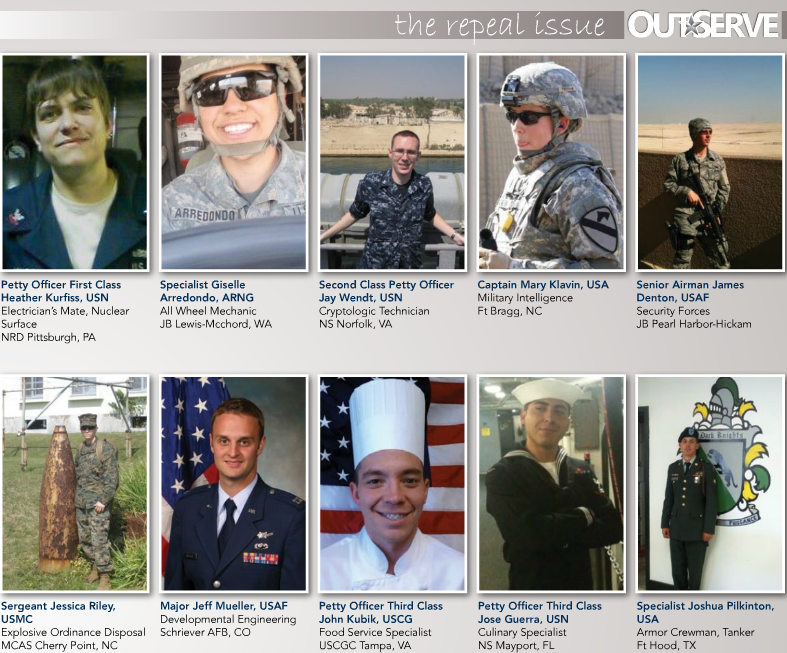After 18 years and more than 14,000 discharges, “don’t ask, don’t tell” finally ended at 12:01 this morning. For the first time in the nation’s 235-year history, gays and lesbians can serve openly in the U.S. military.
President Barack Obama took to Twitter to mark the end of the ban, and the White House posted video of gay veterans talking about what DADT’s demise means to them. A Pentagon press conference is planned later today.
OutServe, a group for active-duty LGBT military personnel, published a DADT repeal issue of its magazine featuring 101 newly out servicemembers. And one gay servicemember stationed in Germany came out to his father in the middle of the night and posted the emotional clip on YouTube (video below).
Servicemembers Legal Defense Network said 100 events are planned in all 50 states to celebrate the end of DADT, including in Austin/Fort Hood, Dallas, El Paso, Houston and San Antonio. The Dallas celebration is from 5:30 to 6:30 p.m. at Resource Center Dallas.
“Today marks the official end of ‘don’t ask, don’t tell’ and is an historic milestone along the journey to achieving LGBT equality in America’s military,” SLDN Executive Director Aubrey Sarvis said in a statement. “Thanks to veterans, active duty, leaders, allies and supporters everywhere, this is a monumental day for our service members and our nation. Indeed, we have taken a tremendous leap forward for LGBT equality in the military.
“Our work is far from done, but today we pay tribute to the service and sacrifice of our patriots as we look forward to a new era of military service — one that honors the contributions of all qualified Americans who have served or who wish to serve,” Sarvis said.
Below are more statements on the end of DADT, as well as video of the gay servicemember coming out to his dad.
Alexander Nicholson, executive director, Servicemembers United:
“On March 15, 1778 the first American servicemember was drummed out of the military for being gay. Since then, tens of thousands more have had their careers ruined and their lives turned upside down by a succession of anti-gay polices and regulations, culminating in the codification of an anti-gay statute in 1993 with the passage of the Don’t Ask, Don’t Tell law. In all, 14,346 men and women were discharged pursuant Don’t Ask Don’t Tell. But thanks to the persistent hard work of unwavering advocates, especially those who have been directly impacted by this issue, and some courageous politicians over the past six years, Don’t Ask, Don’t Tell is now history. As a result, those who continue to serve can sleep easier tonight knowing that they can no longer be arbitrarily fired because of their sexual orientation. Justice has prevailed and Don’t Ask, Don’t Tell is dead. God bless America.”
Rea Carey, executive director, National Gay and Lesbian Task Force:
“Today marks the end of an ugly era in American history. After nearly two decades, lesbian, gay and bisexual service members will finally be able to serve their country openly and honestly. Those who fight for freedom will now themselves be able to live more freely. We celebrate this historic moment, which could not come fast enough. Thousands of exemplary and courageous service members have lost their careers and livelihoods to this unjust policy, once again proving there are very personal and costly consequences of discrimination.
“While we observe this tremendous, hard-fought victory for lesbian, gay and bisexual service members, we recognize the journey is not over. Transgender service members are still being forced to serve in silence. This is unacceptable. All qualified, patriotic Americans willing to risk their lives for this country should be able to do so free from discrimination. In addition, the military still lacks explicit nondiscrimination protections, equal benefits and an inclusive equal opportunity policy for LGBT people. We will continue to work toward the day when full inclusion is a reality in the military.”

















I can’t help but think of the many millions of taxpayer dollars that were wasted, squandered, pissed away and otherwise blown away over this. First, it was the fight to keep DADT in place. Secondly, it was all of the “studies” and “research” necessary to prove that eliminating DADT was, in fact, doing the right thing. (As if it wasn’t already obvious enough). Thirdly, it was all of the money spent discharging service members for whom this never should have been an issue from the start. And lastly, I suspect even more millions of dollars will be spent in an effort to repeal the repeal of DADT. And all the while, when our country is in the midst of the worst economic recession in over a century, when one in six Americans is now living in poverty (source: last week’s news reports) and nobody in Washington can seriously do his/her job because of all the bi-partisan bickering, there will be a handful of lawmakers who have nothing better to do than challenge the repeal, for no reason save their own fifteen minutes of fame.